- Home
- David Downing
Zoo Station Page 2
Zoo Station Read online
Page 2
‘I appealed to his better nature.’
‘There must be someone…’ she began.
‘There isn’t,’ he assured her. ‘The laws don’t apply to Jews, or anyone who acts on their behalf. Just look after the children. They look like they need it.’
‘I don’t need you to tell me…’
‘I know you don’t. I’m just trying…’
She was looking past his shoulder. ‘He’s coming back.’
The Truppführer had a Sturmführer with him, a smaller man with round glasses and a chubby face. Out of uniform – assuming they ever took them off – he put them down as a shopkeeper and minor civil servant. Danzig’s finest.
‘Your papers,’ the Sturmführer demanded.
‘They’re in my hotel room.’
‘What is your name?’
‘John Russell.’
‘You are English?’
‘I’m an English journalist. I live in the Reich, and I have full accreditation from the Ministry of Propaganda in Berlin.’
‘We shall check that.’
‘Of course.’
‘And what are you doing here?’
‘I came to see what was happening. As journalists do. I intervened in the argument between your colleague and this Red Cross worker because I thought his behaviour was damaging the reputation of the Reich.’
The Sturmführer paused for thought, then turned to his subordinate. ‘I’m sure my colleague regrets any misunderstanding,’ he said meaningfully.
The Truppführer looked at the woman. ‘I apologise,’ he said woodenly.
‘He apologises,’ Russell told her.
‘Tell him to go to hell,’ she said.
‘She accepts your apology,’ Russell told the two Brownshirts.
‘Good. Now she must get back on the train, and you must come with us.’
Russell sighed. ‘You should get on the train,’ he told her. ‘You won’t get anywhere by protesting.’
She took a deep breath. ‘All right,’ she said, as if it was anything but. ‘Thank you,’ she added, offering her hand.
Russell took it. ‘Tell the press when you get back to civilization,’ he said. ‘And good luck.’
He watched her mount the steps and disappear into the train. The children were all aboard now; most had their faces pressed against the windows, and were frantically wiping their breath from the glass to get a last clear look at their parents. A few had managed to force back the sliding ventilators and wedge their faces in the narrow. Some were shouting, some pleading. Most were crying.
Russell tore his gaze from the windows just in time to see a small girl leap nimbly down from the train and race across the platform. The storm trooper by the door spun to catch her, but slipped in the slush as he did so, and fell face-first onto the platform. As he struggled to his feet a boy of around ten rushed past him.
The little girl’s arms were tightly wrapped around her kneeling mother’s neck. ‘Esther, we have to get on the train,’ the boy said angrily, but daughter and mother were both crying too hard to notice him. The father’s anguished appeals to reason – ‘Ruth, we have to let her go; Esther, you must go with your brother’ – fell on equally deaf ears.
The storm trooper, red-faced with anger, took a fistful of the girl’s long black hair and yanked. The shock tore her arms from her mother’s neck, and he started dragging the girl across the slush-strewn platform to the train. The mother shrieked and went after them. The man let go of the girl and crashed his rubber cosh across one side of the mother’s face. She sank back, a rivulet of blood running onto her coat collar. As the storm trooper went to hit the woman again, her husband grabbed for the cosh, but two other Brownshirts wrestled him to the ground, and started raining down blows on his head. The boy picked up his whimpering sister and shepherded her back onto the train.
More storm troopers came racing up, but they needn’t have bothered. Like Russell, the watching parents were too stunned to protest, let alone intervene.
‘I don’t want to go,’ a small voice said behind him.
He turned to find its owner. She was standing on a seatback in the train, her face twisted sideways in an open ventilator window, brown eyes brimming with tears. She couldn’t have been more than five.
‘Please, can you tell the policemen that I don’t want to go? My name is Fraulein Gisela Kluger.’
Russell walked across to the train, wondering what on earth he could say. ‘I’m afraid you have to make this trip,’ he said. ‘Your mother and father think you’ll be safer in England.’
‘But I don’t want to,’ she said, a large tear sliding down either cheek.
‘I know, but…’ Another whistle shrilled down the platform; a spasm of steam escaped from the locomotive. ‘I’m sorry,’ he said helplessly.
The train jerked into motion. A momentary panic flitted across her face, followed by a look that Russell would long remember – one that blended accusation, incomprehension and the sort of grief that no five year-old should have to bear.
As the train pulled away a tiny hand poked out through the window and waved.
‘I’m sorry,’ Russell murmured.
A hand grasped his arm. The Truppführer’s. ‘You, English. Come with us.’
He was ushered down the platform in the Sturmführer’s wake. Most of the mothers and fathers were still focussed on the disappearing train, their eyes clinging to the red tail-light, the last flicker of family. They had sent their children away. To save their lives, they had turned them into orphans.
One woman, her eyes closed, was kneeling in the snow, a low keening noise rising up from inside her. The sound stayed with Russell as he was led out of the station. The sound of a heart caving in.
In the goods yard the Truppführer pushed him towards a car. ‘My hotel’s just across the road,’ Russell protested.
‘We will collect your papers,’ the Sturmführer said.
As they bundled him into the car, it occurred to Russell that Shchepkin’s envelope was still sitting on his nightstand.
Danzig was waking up as they drove back towards the city centre, shopkeepers clearing the night’s snow off their patches of sidewalk. Russell kept his eyes on where they were going, hoping to God it wasn’t some SA barracks out of humanity’s hearing range. As they pulled up outside an official police station on Hundegasse he managed to suppress a sigh of relief.
The Truppführer pulled him out of the car and pushed him violently towards the entrance doors. Russell slipped in the snow, and fell onto the steps, catching a shin on one of the hard edges. He had no time to check the wound, though – the Truppführer was already propelling him forward.
Inside, a uniformed police officer was cradling a steaming cup of coffee. He looked up without much interest, sighed, and reached for the duty book. ‘Name?’
Russell told him. ‘I’m English,’ he added.
The man was not impressed. ‘We all have to come from somewhere. Now empty your pockets.’
Russell did as he was told. ‘Who’s in charge here?’ he asked.
‘The police or the SA?’
The policeman gave him a contemptuous look. ‘Take a guess,’ he suggested.
Russell felt a sinking sensation in his stomach. ‘I want to speak to the British Consulate,’ he said.
‘No need for that,’ the Truppführer said behind him. ‘What’s your hotel name and room number?’ Armed with this information, he went back out through the doors. Russell had a glimpse of grey light in the eastern sky.
He tried pleading with the duty officer, and received a shrug for his pains. A younger policeman was summoned to take him downstairs, where two rows of cells lay either side of a dimly-lit corridor. They had tiled floors and brick walls, black up to waist level, white above. It only needed a splash of blood to exhaust the Nazi palette.
Russell slumped to the floor, his back against the far wall. No need to feel frightened, he told himself. They wouldn’t do any permanent damage to a foreig
n journalist.
They would if they thought he was a spy. What had Shchepkin put in the damn envelope? If Russell’s past experience of Stalin’s NKVD security police was anything to go by, there was an institutional reluctance to spell anything out which verged on paranoia. And they wouldn’t want to leave him with anything he might conceivably use against them.
All of which was good news.
But what language was the damn letter written in? If it was in Russian, or if roubles were mentioned, that would be enough for goons like the Truppführer.
He told himself to calm down. He had talked himself out of worse situations than this.
His shin was oozing blood, but didn’t look too bad. His stomach felt queasy, though whether from hunger or fear was hard to tell. Both, probably.
It felt like more than an hour had passed when he heard feet on the stairs. Booted feet, and several of them.
The sliding panel on his door clanged open and clanged shut again. The boots moved on. Another clang, but this time a door swung open. A voice protested – a voice Russell thought he recognised – the Jew who’d tried to protect his wife. The voice rose, and was cut off, leaving echoes inside Russell’s head. What had cut it off? A fist? A knee? A cosh? A door slammed shut.
Silence reasserted itself, a heavy silence which offered no reassurance. Eventually a door scraped open, a remark drew laughter, and the boots were back in the corridor. Russell felt his breath catch as they headed his way, but they clattered on past and up the stairs, leaving him staring at his shaking hands. Pressing his ear to the door he could hear no groans of pain, only the stillness of unconsciousness or death.
Time went by. He’d rushed out of the hotel without his watch, and when a tray of food was eventually shoved through his hatch he wondered if it was lunch or supper. The boots never came back, and with each hour that passed he found himself feeling a little more optimistic. When the door finally opened, his stomach lurched, but it was only the policeman who’d brought him down.
‘This way, Herr Russell,’ the man said, nodding him towards the stairs.
They beat people up in the cells, Russell told himself. Upstairs had to be better.
Two corridors and two flights of stairs later, he was ushered through a door labelled Kriminalinspektor Tesmer. The man himself had greased black hair, blue eyes, thin lips, and a bad case of five o’clock shadow. ‘Please sit,’ he told Russell.
He took one last look at the Englishman’s passport, and then passed it across the desk along with the journalist’s accreditation. There was no sign of Shchepkin’s envelope.
‘Everything is satisfactory,’ Tesmer said with a sudden, unconvincing smile. ‘And I’m sorry this has taken so long.’
Russell reached for his documents. ‘I can go?’ he asked, trying not to sound too relieved.
‘Just one question.’
‘Yes?’ There was no life behind the eyes, Russell thought. This was a man to be careful with.
‘Why did you come to Danzig, Herr Russell? To write a story about the Jewish children?’
‘No. I had no idea a kindertransport was leaving from here. I’m staying at the hotel opposite the station, and the noise woke me up. I just walked across to see what was going on.’
‘Then why did you come?’
Why indeed? Because he’d felt drawn to the place, the way a good journalist was always drawn to a story that mattered. A city in thrall to thugs and fools, and doomed for precisely that reason. Danzig was Europe writ small. It was a story for everyone.
Almost everyone.
‘Stamps,’ he said, suddenly remembering a conversation he’d overhead in the Café Weitzke. The city’s German and Polish post offices were both putting out stamps to commemorate centuries-old victories over each other. ‘I do occasional pieces for philately journals, and the two Post Offices here are bringing out some interesting new issues. I’m hoping to interview the postmasters tomorrow.’
Tesmer looked disappointed, like a fisherman realising that this catch was too small to eat. ‘Enjoy your stay,’ he said curtly.
Once outside, Russell discovered it was almost ten o’clock. A bar supplied him with a sandwich and a much-needed drink, and he trudged back to his hotel through mostly empty streets. Shchepkin’s envelope was still lying where he’d left it.
It had been opened, though. Russell took out the single sheet and read it. They wanted four articles of between 1,200 and 1,500 words, delivered at fortnightly intervals, beginning in mid-January. The money was more generous than he’d expected – as much as an ordinary Soviet worker earned over a Five Year Plan. The thought crossed his mind that a car would transform his Saturdays with his son Paul.
The letter was in German, the promised fee in Reichsmarks. There was nothing to say where the offer came from or what the articles would be about. ‘God bless the NKVD,’ Russell murmured to himself.
He woke around ten. Thick snow was cascading past his window, almost obscuring the station opposite. He used the lobby phone to call the two Post Offices, and was granted audiences with their Postmasters late that afternoon. When he emerged from the Café Weitzke on Langgasse, replete with scrambled eggs, Kashubian mushrooms and a mocha, it was still only midday. He had five hours to kill.
It had almost stopped snowing, but the sky was still heavy with cloud. As he stood there wondering what to do, there was a sudden swell of music from the loudspeakers which peppered the city. Hitler’s New Year speech to the nation, Russell remembered. Danzig wasn’t yet part of the German Reich, but try telling the Nazis that.
Russell sometimes enjoyed listening to Hitler. The man’s sheer effrontery was entertaining, and knowing that millions were being taken in by his ludicrous bloodlust gave the whole experience a deplorably thrilling edge. If the Führer told them that gravity was a Jewish trick then millions of Germans would be practising levitation before the sun set.
Russell wasn’t in the mood. A couple of hours by the sea, he thought. There wouldn’t be any loudspeakers on the beach.
Hitler was just being introduced when a tram with a Brosen destination board burrowed out of the Langgasse Gate. Russell took a seat on the right and watched through the window as the tram skirted the Holzmarkt, swung right into Elisabethwall, and passed his hotel at the bottom of the Stadtgraben.
It was about six kilometres to Brosen. Russell had taken the same ride back in 1935, during his last visit to Danzig. He’d been doing a series of articles on Germans at play, and it had been the middle of summer. The resort had been awash with holiday-makers, and he had gone for a paddle.
Not today. It was as dark as it had been all morning, and the sparks from the overhead wires lit up the housefronts on either side of the street as the tram clanged and squealed its way out of the city. The loudspeakers were still audible, though. As they passed through the outlying suburbs of Langfuhr and Saspe, Russell caught snatches of the familiar voice, and one short passage in which the Führer offered the German people his fulsome congratulations for their ‘wonderful behaviour’ in 1938. He was probably talking about Kristallnacht.
By the time the tram reached Brosen the sky had visibly lightened. Russell got off outside the closed casino, where a single loudspeaker was doing its manful best to distort the Führer’s message. Russell listened to the crackle for a few seconds, struck by the notion that he and Hitler were sharing a private moment together. The latter was promising help with the ‘general pacification of the world’. Russell wondered how much irony one nation could eat.
He walked down past the boarded-up refreshment stands and padlocked beach huts to the snow-strewn beach. The previous season’s final water temperature was still legible on the lifeguard hut blackboard, alongside a poster explaining the mysteries of artificial respiration. The men in the poster all wore striped bathing suits and moustaches, like a posse of cartoon Führers.
The sea was gunmetal grey, the sky almost as dark, slate grey with a yellowish tinge. There was no one in sight.
A couple of kilometres to the east, two beacon lights marked the end of Danzig’s channel to the sea, and Russell started walking towards them. Out to the left the lighthouse at the end of the dredged channel flickered into life with each revolution. To the north, a darker line marked the outflung arm of the Hela peninsular. Between the two a smudge of a freighter was inching out across the bay.
The stamp story was made for him, he thought. A story that amused, and didn’t condemn. A story of stupidity, and rather lovable stupidity at that. He could implant a few ironies just beneath the skin of the text for those who wanted to pick at it, leave enough clues to the real situation for those who already understood it. They would congratulate themselves on reading between the lines, and him for writing between them. And he could sit on his necessary fence for a few more months, until Hitler drove something through it.
Too many metaphors, he told himself. And not nearly enough satisfaction.
He thought about the real Danzig story. Ten years ago he’d have written it, and written it well. But not now. Step out of line that far, and the toadies at the Propaganda Ministry would have him deported before he could say ‘Heil Hitler’. He’d be saying goodbye to his son, probably for the duration of a war. And probably to Effi as well. She’d told him often enough that she’d go to England, or better still America, with him, but he had his doubts whether she meant it, whether she’d ever willingly leave her sister, parents, agent and vast array of friends for life in a new country where no one knew who she was.
He left the path and walked down to the edge of the water, searching for pebbles to skim. He wanted to take Shchepkin’s offer, he realised, but he wasn’t sure why. He only half-bought the argument that by helping the Soviets he’d be hurting the Nazis. If he really wanted to take Hitler on there were more effective ways, most of them depressingly self-sacrificial. The money would be nice, but the risks would be high. The Nazis still beheaded spies.
He skimmed a flat pebble between two waves. Could he trust Shchepkin? Of course he couldn’t. The Soviets might want what they said they wanted – no more, no less – but even if they did, that wouldn’t be the end of it. You didn’t do a few articles for Stalin, bank the cheques and move on. You would be on a list, one of their people, someone to call up when something else was needed. And once you were on the list, they took refusals badly.

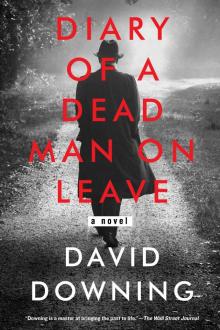 Diary of a Dead Man on Leave
Diary of a Dead Man on Leave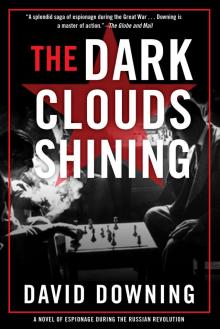 The Dark Clouds Shining
The Dark Clouds Shining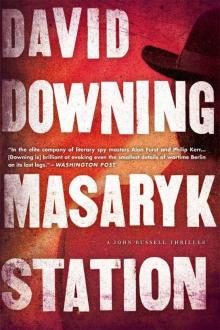 Masaryk Station (John Russell)
Masaryk Station (John Russell)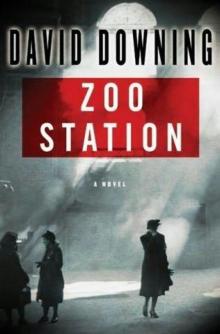 Zoo Stationee
Zoo Stationee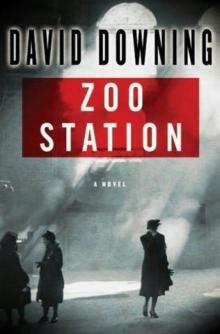 Zoo Station jr-1
Zoo Station jr-1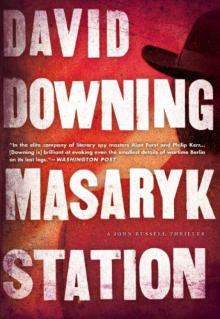 Masaryk Station
Masaryk Station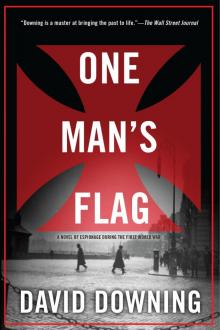 One Man's Flag
One Man's Flag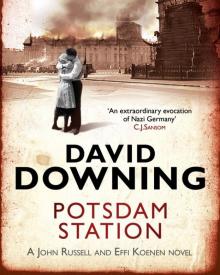 Potsdam Station jr-4
Potsdam Station jr-4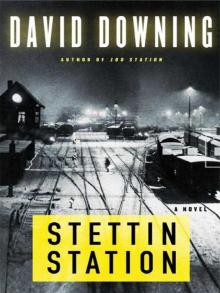 Stattin Station jr-3
Stattin Station jr-3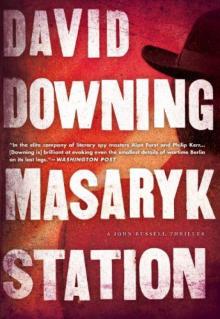 Masaryk Station jr-6
Masaryk Station jr-6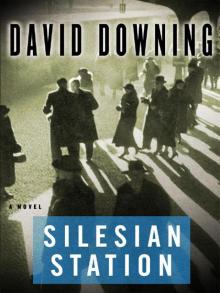 Silesian Station (2008) jr-2
Silesian Station (2008) jr-2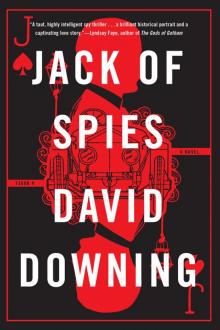 Jack of Spies
Jack of Spies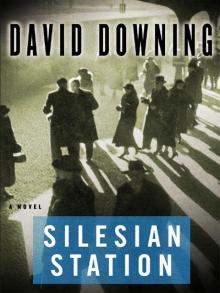 Silesian Station (2008)
Silesian Station (2008) The Moscow Option
The Moscow Option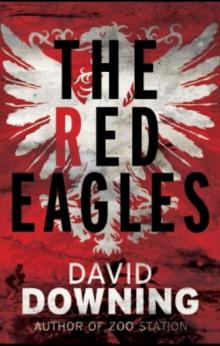 The Red Eagles
The Red Eagles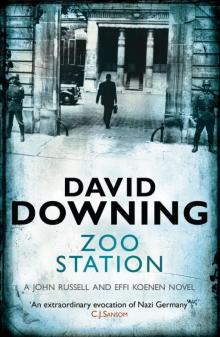 Zoo Station
Zoo Station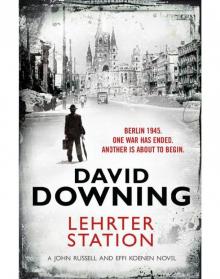 Lehrter Station
Lehrter Station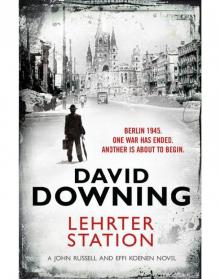 Lehrter Station jr-5
Lehrter Station jr-5